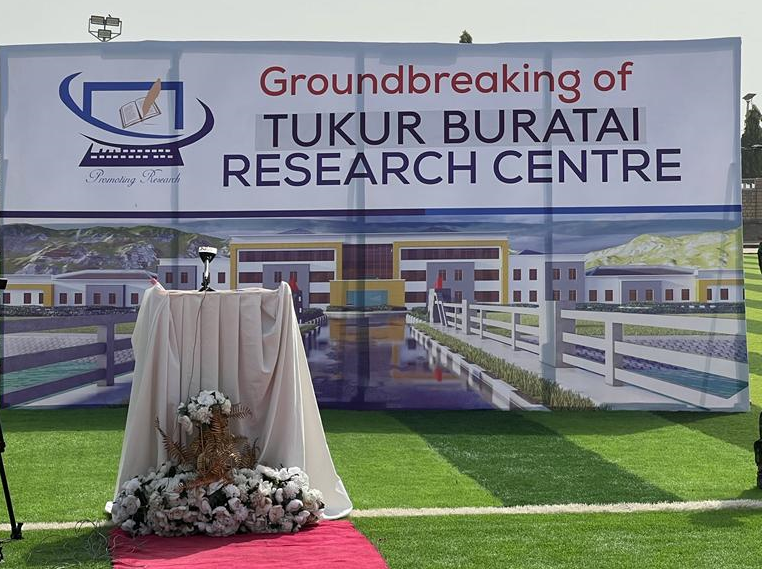
TBRC Principle
Our Story
The Tukur Buratai Research Centre (TBRC) is an Abuja based non-governmental and non-profiting making private initiative that was established on 28th October 2019. It was established to carry out and assist research on peace, security, and defence-related matters in Nigeria and beyond. We research both on local and international security issues, supports teaching, collaboration, and cross-fertilization of ideas in the field of security and defence, through seminars, conferences, and publications. Today, global challenges have yet again evolved and intensified. The threats that emanate from fragile states continue to be primary drivers of violent conflict. Meanwhile, the rise of global and regional competition is extending and exacerbating violent conflicts in these fragile states. Global threats that require both national and international cooperation are increasing and deepening just as the international systems that enable this cooperation are under heightened strain.
These and more strengthens our resolve at TBRC to provide global partners and researchers with a clear pathway for addressing this new, more complex environment and to allowing for the agility and creativity necessary to fulfil our mission in a fast-changing world.
What We Stand For
In the discussion over civil-military ties, the word “peacebuilding” is new and rarely used. It’s a wide term that refers to any activity aimed at preventing and resolving violent conflict. It is, however, more directly concerned with establishing a setting in which violent conflict is less likely to occur, as opposed to dealing with specific issues or individuals as implied by other terminology such as conflict prevention, peacemaking, and peacekeeping. In this sense, it has long been assumed that peacemaking is a political activity carried out by state actors through diplomacy and negotiation. A variety of acts by a variety of actors across society are required to build an atmosphere in which peace can be built. Peacebuilding encompasses processes ranging from micro level changes in the opinions and behavior of conflicting communities to macro-level Institutional changes that address the structural causes of conflict. It is, therefore, vital to help break down enmities and build trust across several levels in societies. It is crucial to appreciate the gendered impact of conflict in that men and women are affected by the conflict in different ways and contribute differently to building peace at different levels within their communities. The needs and priorities of each must be taken into consideration in peacebuilding efforts.
Our impact is broader and more enduring when we work with partners in government, academia, multilateral organizations, civil society, and business around the world.
We test new ways of addressing challenges, and incorporate lessons learned into future work, and share our knowledge, techniques, experiences, and resources to help others build peace.
Efforts to prevent, mitigate, and resolve violent conflicts should be tailored to each issue because the complexity of violent conflict requires responses with constant adaptation.
TBRC is a premier global resource for scholars, policymakers, and practitioners’ in the field. Through our work, we shall develop research and analysis that deepen understanding of the complexities of conflict and inform practical tools and skills.
At TBRC’s headquarters, experts from many sectors and views will share their expertise, advancing the Center’s leadership and fostering vibrant communities of practice. TBRC’s recommendations improve policy and practice to prevent, mitigate and resolve violent conflict more effectively. Deepen our research and thought leadership on how the interplay of environmental shocks, rapid population growth, and poor governance affect the risks of violence in the places we work. Empower individuals and institutions through improved training and education programs, greater alignment of our programs against the new strategic landscape, greater accessibility of archived scholarship and research, and expansion of our global network of partners and institutions.
We focus on peacebuilding objectives that promote inclusion, strengthen community security, and bridge divides in fragile environments as vital elements for transforming fragility into resilience among the people.
Efforts to prevent, mitigate, and resolve violent conflicts must be grounded in empirical evidence and rigorously evaluated for impact.
TBRC will continue to support our workforce to be effective in a fast-changing environment. Individually and collectively, we will challenge ourselves to model the behaviors and values that enable peace and conflict resolution. We will recruit, reward, develop, and deploy the most talented individuals with the skills and passion for fulfilling our mission. At the same time, we will challenge and support our people, ensuring that they prepare for the demanding work of peacebuilding. The Center will seek out and develop influential leaders. In addition to being experts in their field, bring out the best in others and model integrity, respect, accountability, and trust. Reinforce a culture of shared responsibility that translates into a deep commitment to each other, our work, and the people and partners we serve. Provide our workforce with learning and development opportunities that encourage individual and collective growth. Create opportunities for collaboration and creative problem-solving. Establish organizational policies, processes, and systems that are as user-friendly as possible and appropriate.
TBRC teams combine researchers, policy analysts, educators, and practitioners—both local and foreign —in a culture of collaboration that unlocks better ideas and effective action. The Center applies research through training, education, policy recommendations, and application of best practices in conflict zones.
TBRC distinct status—as formally independent but with a unique link to the government will enable us to serve as a trusted connector among foreign governments, civil societies, and government officials. TBRC work complements and supports other government efforts in-country. The Center also has the latitude to maintain a sustained presence in conflict zones, enabling our teams to build the trust, relationships, and knowledge necessary to work toward our mission.
TBRC is committed to supporting, engaging, and educating the field of peacebuilding by working with a diverse set of partners. We will work with partners in-country and elsewhere around the world to support individuals, academic partners, organizations, and communities of practice through research, convening key stakeholders, programming, grants, fellowships, and promotion of strategies to prevent, mitigate, and resolve violent conflict.
